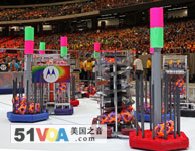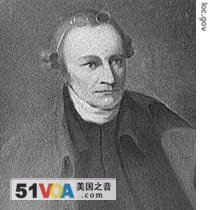2009-4-23
Welcome to AMERICAN MOSAIC in VOA Special English.
(MUSIC)
I'm Doug Johnson. This week ...
We play new music from jazz artist Diana Krall ...
And answer a question about American revolutionary leader Patrick Henry.
But first, we report on a "sporty" international competition in robot building.
(MUSIC)
FIRST Championship
HOST:
Last weekend, twenty thousand people gathered in the state of Georgia to watch students from twenty-eight countries compete with robots they built. More than ten thousand students and more than five hundred robots took part in the competition. Faith Lapidus tells us about it.
FAITH LAPIDUS:
The students and their robots competed at the FIRST Championship at the Georgia Dome in Atlanta. FIRST is the short way of saying the organization's complete name: For Inspiration and Recognition of Science and Technology.
Almost one thousand seven hundred high school teams entered a level of competition called LUNACY. The competitors came from eleven countries, including the United States.
 |
| Competitors at the FIRST Championship |
A second competition involved building a robot that could travel on uneven surfaces, move objects with unusual shapes and withstand physical stress.
Another competition was for younger students, ages nine to fourteen years old. Eighty-four teams from twenty-seven countries competed with robots made with LEGO products. They had to design, build and program robots to explore the Earth's climate.
American inventor Dean Kamen started FIRST in nineteen eighty-nine to increase young people's interest in science and technology. The organization holds robotics competitions around the world. It offers programs that help young people learn more about science, technology, engineering and mathematics, while building life skills. Many companies provide support to the organization.
Mister Kamen says the goal is about more than building robots. He says the student competitors showed they could solve difficult technological problems. And, he says that is good news because the world needs creative thinkers to help solve increasingly complex problems in the future.
(MUSIC)
Patrick Henry
HOST:
Our listener question this week comes from China. James Green wants to know about Patrick Henry, an important leader of the American Revolution.
Patrick Henry is most famous for a speech he gave in seventeen seventy-five to support his proposal to raise forces to defend the colony of Virginia against the British. Patrick Henry said, "give me liberty or give me death."
He was born in seventeen thirty-six in Hanover County, Virginia, near Richmond. His father was a well-educated farmer from Scotland.
 |
| Patrick Henry |
At eighteen, Patrick married a sixteen year old named Sarah Shelton. Her father gave them a farm, house and slaves. But a fire destroyed the farm a few years later. The Henrys had six children together. But Sarah Henry became mentally ill and died in seventeen seventy-five. Henry then married Dorothea Dandridge who came from a rich and socially important Virginia family. He and his second wife had ten more children.
In seventeen sixty, when he was in his middle twenties, Patrick Henry had decided to become a lawyer. He became successful and gained fame as a rebel.
One of Patrick Henry's first cases took on the British government and the Anglican Church. Henry won the case, condemned the clergy involved and questioned British rule all at the same time. The case won him fame for his power of speech.
Patrick Henry was elected to the Virginia legislature in seventeen sixty-five. He represented Virginia in the Continental Congress in seventeen seventy-four. He famously said: "The distinctions between Virginians, Pennsylvanians, New Yorkers and New Englanders are no more. I am not a Virginian, but an American."
However, Henry strongly believed in states' rights over federal powers. He supported a weak central government. For this reason he fought the approval of the proposed United States Constitution.
But he lost that battle. Virginia approved the Constitution in seventeen eighty-eight. However, Patrick Henry used his powerful gift of speech to get passage of some amendments. These later became the Bill of Rights.
Patrick Henry served five terms as governor of Virginia. He died in seventeen ninety-nine at the age of sixty-three. In his final document to his family, he advised his descendants to "practice Virtue thyself, and encourage it in others."
(MUSIC)
Diana Krall
HOST:
This week, we continue to honor Jazz Appreciation Month with the music of jazz singer and pianist Diana Krall. The Canadian-born performer recently released her twelfth album. "Quiet Nights" combines the sensual beat of Brazilian bossa nova with the smooth sound of jazz. Diana Krall says the songs are a love letter to her husband, British rock singer Elvis Costello. Barbara Klein has more.
(MUSIC)
 |
| Diana Krall |
That was the song "You're My Thrill." Like many songs on the album "Quiet Nights" it is a good example of Diana Krall's soft and smoky voice.
Krall says she was influenced to make this album because of a trip she made to Brazil last year. She said she heard the sounds of bossa nova music everywhere she went.
Here is the album's title song, "Quiet Nights." This song by the Brazilian composer Antonio Carlos Jobim first became famous in the early nineteen sixties.
(MUSIC)
Diana Krall says that making "Quiet Nights" was a very natural and joyful process. At the end of recording every day, she says she had something wonderful to look forward to – being with her two infant sons.
Diana Krall will be performing songs from her new album in Canada and United States this spring and summer. We leave you with "Too Marvelous for Words."
(MUSIC)
HOST:
I'm Doug Johnson. I hope you enjoyed our program today.
It was written by Dana Demange, Shelley Gollust and Caty Weaver who was also the producer. For transcripts, MP3s and podcasts of our programs, go to 51voa.com.
Send your questions about American life to mosaic@voanews.com. Please include your full name and where you live. Or write to American Mosaic, VOA Special English, Washington, D.C., two-zero-two-three-seven, U.S.A.
Join us again next week for AMERICAN MOSAIC, VOA's radio magazine in Special English.